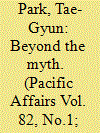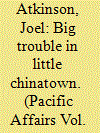| Srl | Item |
| 1 |
ID:
088723


|
|
|
| 2 |
ID:
088721


|
|
|
|
|
| Publication |
2009.
|
| Summary/Abstract |
Taiwan's effort to carry on diplomatic relations in the face of hostility from China has collided with Australia's reform agenda for the Pacific Islands. This issue is particularly acute in Solomon Islands, which has longstanding ties with Taiwan and a close association with Australia. In the lead-up to the April 2006 elections in Solomon Islands, a local politician accused Taiwan of funding candidates. The same politician later stated that popular anger towards Taiwan sparked the post-election riot that devastated Honiara's Chinatown. Although neither of these accusations was supported with evidence, they prompted Australia to publicly criticize Taiwan's involvement in Solomon Islands. This article argues Australia's reaction was due to existing Australia-Taiwan tension over the South Pacific, and because Australian policymakers found Taiwan a more palatable focus than acknowledging the ambitious reach of Australia's reform efforts. Australia's rhetoric drew a negative reaction from Taiwan, which believed Canberra was seeking a scapegoat to deflect from its inability to anticipate or control the riot. The incident also contributed to the Taiwan government's perception of Australia as increasingly pro-China. Despite subsequent efforts from Taiwan and Solomon Islands to improve accountability for Taiwan's aid, the differing interests of Australia and Taiwan continued to be an issue as funding from Taiwan became more important to Solomon Islands Prime Minister Sogavare during his dispute with Australia. This article examines the interaction between Australia and Taiwan over Solomon Islands, and considers its significance to wider Australia-Taiwan involvement in the South Pacific.
|
|
|
|
|
|
|
|
|
|
|
|
|
|
|
|
| 3 |
ID:
088722


|
|
|
| 4 |
ID:
088718


|
|
|
|
|
| Publication |
2008.
|
| Summary/Abstract |
This paper examines North Korean economic and policy changes since 1984 from an institutional perspective by focusing on the following four critical junctures: the Law of the Management of Joint Ventures in 1984; the policy of special economic zones in 1991; the mass starvation from 1995 to 1998; and the Economic Improvement Measures in 2002. How did broad situational change play a role in the North Korean government's policy changes and how did the policy changes contribute to institutional change in the North? Were there any policy conflicts among the North Korean elite? How did power struggles among the elite influence policy outcomes? The paper argues that a specific institutional area's arrangement is broadly divided into two categories of rules and norms: one set of hegemonic and several sets of non-hegemonic rules and norms. The hegemonic rules and norms define the main features of an institutional order. Each set of non-hegemonic rules and norms compete with the hegemonic for the dominant status in institutional settings. This competition between hegemonic and non-hegemonic rules and norms functions as the medium of institutional development. Since 1984, the contention between hegemonic socialist and non-hegemonic capitalist rules and norms has defined economic institutional change in North Korea.
|
|
|
|
|
|
|
|
|
|
|
|
|
|
|
|
| 5 |
ID:
088720


|
|
|
|
|
| Publication |
2009.
|
| Summary/Abstract |
The most important power granted to autonomous areas in China's system of Nationalities Regional Autonomy should allow them to modify higher-level laws and policies through autonomy legislation. This is one of the two principal methods for the exercise of autonomy, with the other being the holding of key government posts by minority members. Yet efforts by the five autonomous regions to exercise their powers to enact autonomy legislation have been repeatedly blocked. The granting of autonomy powers in the PRC has been half-hearted, and few powers commonly associated with autonomy systems are available to autonomous areas. Even so, in China as elsewhere, giving autonomy legal expression, however vague, has made the law a field for contention over its proper meaning and scope.
Based primarily on Chinese documentary sources, this article focuses on contestation over the meaning of autonomy in the terrain of law. In their explorations of the modification power and the relative status of autonomy legislation, legal scholars and minority activists articulate a vision of autonomy under a future constitutionally governed state. Such an "extensive" autonomy, defined by its historical roots to allow for different "systems," could potentially provide some space for real self-government. In contrast, some powerful central government institutions block development of this field of law, implicitly supporting the view that autonomy is history and economic development holds the key to the future. Even given the necessary political will, in the absence of the key components of autonomy systems, divisions within the Chinese state could create barriers to the realization of "genuine autonomy."
|
|
|
|
|
|
|
|
|
|
|
|
|
|
|
|